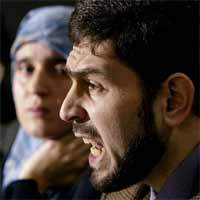Olivia Ward
When Ottawa computer expert Maher Arar arrived back in Canada this week after a year of captivity, his account of torture in Syria and Jordan shocked many. Arar, who was seized by American officials in New York during a flight back from a family visit, has called for a full investigation of Canada’s role in his ill-treatment, which he said included confinement in a dark, filthy cell, beating and psychological abuse.

A damaged and bitter Maher Arar, with his wife Monia Mazigh, recounts his ordeal after he was arrested in New York, and deported by the USA authorities to Syria.
Arar also encountered another Syrian-born Canadian, Abdullah Almalki, in the Syrian jail, and reported he had received even more severe treatment. For Canada, accusations of complicity in offshore torture and abuse of people suspected of political crimes are unprecedented. And they are directly linked to the worldwide anti-terrorism crackdown following the Sept. 11, 2001, attacks on the United States.
But for the USA, deportation of suspects to countries where torture is conducted by proxy ? “rendition” as it is known in American intelligence circles ? is part of a larger pattern that is causing alarm, and critics say it’s damaging America’s image in the international community.
“There have been a series of these ‘renditions’, mainly to countries in the Middle East,” says Tom Malinowski, director of Human Rights Watch’s office in Washington. “We don’t really know how many people have been sent there, because it’s kept highly secret.”
In the United States, security services are barred from conducting torture on American soil, and the government officially denies any links with torture. Both the United States and Canada are also bound by the International Convention Against Torture, which rules out surrendering citizens to countries that brutally violate human rights.
However, intelligence agents, including former CIA operative and author Robert Baer, have admitted in media interviews that turning over suspected terrorists to countries noted for their violent interrogation methods is now common practice in a no-holds-barred war on terrorism. “We are doing a number of ?renditions? and they have been very productive,” says a Washington Post report this week, quoting a “senior USA intelligence official.”
In a previous interview with the Post, another official was more explicit: “We don’t kick the s--- out of them,” he says. “We send them to other countries so they can kick the shit out of them.”
The most frequently used offshore torture depots are Jordan, Syria, Egypt and Morocco, human rights groups say. Ironically, those countries are frequently criticized by the USA State Department in its annual surveys of international human rights.

Since it is politically inexpedient for the USA to house it?s illegally held POWs in Guantanamo Bay, most are sent for interrogation in third-country prisons, like this one in Afghanistan.
Syria, according to the latest report, commonly uses such methods as “pulling out fingernails, forcing objects into the rectum, using a chair that bends backwards to asphyxiate the victim or fracture the spine.” In a speech promoting democracy in the Middle East, President George W. Bush likened Syria’s leaders to Iraq’s Saddam Hussein, accusing them of leaving “a legacy of torture, oppression, misery and ruin.”
In Egypt, meanwhile, the State Department noted that suspects are “stripped and blindfolded, suspended from a ceiling or door frame with feet just touching the floor, beaten with fists, whips, metal rods, subjected to electric shocks.” In Morocco, an Amnesty International report released this week cites testimony of victims who were “strung up and beaten with metal poles or wooden rods to extract confessions ...”
While there are numerous reports of suspects transported and tortured in Middle Eastern countries, there are also allegations of severe mistreatment of Al Qaeda suspects at the American detention centre of Guantanamo Bay. “Statements made by USA officials suggesting that the USA government condones the mistreatment and possibly even the torture of prisoners and detainees gravely concerns Amnesty International,” says a letter issued by London-based human rights group earlier this year.
However, the use of offshore torture for political ends is not new for Washington. In the 1960s, the USA was accused of sponsoring a campaign of torture in Vietnam, carried out by local mercenaries against suspected Viet Cong guerrillas.
Investigative reports later spoke of a continuing program for “intelligence training for friendly foreign countries,” which included torture techniques used against America’s Cold War enemies, such as Latin American communist guerrillas. In the ‘70s, Washington-trained police and militaries were responsible for alleged human rights violations in the region.
In the 1990s, Washington reportedly began a covert practice of “rendition,” using governments in Nigeria, the Philippines, Kenya and South Africa. After Sept. 11, the number of people shipped to offshore locations to extract information by means that are banned in the USA appears to have increased, although the secrecy surrounding the practice has prevented rights organizations from monitoring exact figures.
“Silence or indifference from the United States will be perceived as an indication that this country condones torture and other egregious abuses,” says Amnesty International.
Article courtesy of the Toronto Star